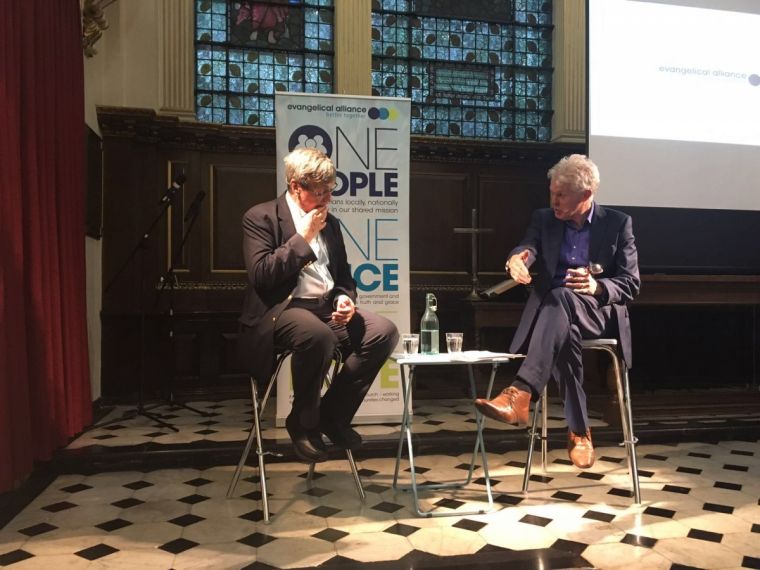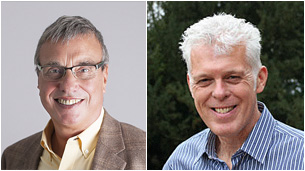Does Evangelicalism Have A Future? Yes, Says Clive Calver – But Only If It Puts Jesus First

'I don't ask anyone to believe in Jesus. I don't ask people to receive Jesus. We've banned it in our church.'
Clive Calver is enjoying the shock tactic of these statements, which he leaves hanging for perhaps a beat too long before going on to explain that where he now lives, in New England, nominal Catholicism is high, and if you ask people to do either of these things, they'll just politely go along with it.
"If you ask people do you believe in Jesus, they'll say yes of course. If you talk about surrender to Jesus, or being baptised, that starts to mean something."
Calver, who was general director of the Evangelical Alliance from 1983-1997, left for the States nearly 20 years ago and is perhaps uniquely placed to discuss the differences between US and UK evangelicalism, as well as how things have changed for UK evangelicals since then.
When he joined the EA in 1983, British evangelicalism was still feeling the aftershocks from John Stott's run-in with Martyn Lloyd-Jones in 1966, when the latter, speaking at a conference organised by the EA urged evangelicals to leave their "mixed" denominations in the name of doctrinal purity. Stott publicly opposed him and is credited with keeping many evangelicals, particularly Anglicans, loyal to their denominations.
The landscape changed enormously while he was in charge, and for many he is synonymous with the triumphant, swaggering highs of the '90s evangelicalism, when Noel Richards filled stadiums and Spring Harvest boasted attendance in the many tens of thousands.

The picture is very different now. We have witnessed the death of nominal Christianity, in which people sort of assumed they were Christians because that's what you were if you were British. Today, according to the EA's Talking Jesus research, carried out with the Church of England, 40 per cent of the British public are not convinced Jesus Christ even existed. Sixty per cent of non-Christians surveyed had never had a conversation with a Christian about their faith.
The churches might be emptier, but it's argued – perhaps a little desperately – that those who are left are more committed.
There has also been the rise of radical Islam, which has lent an edge to inter-faith relations that wasn't there before, and a startling shift in views about human sexuality, which has wreaked havoc in the major denominations and left conservatives looking a long, long way out of touch with the wider culture. And another factor in evangelical life has been repeated clashes between secular society and Christians asserting their rights, often fought out in the courts.
The Evangelical Alliance has inevitably been involved in some of these tussles. But alongside shifts in the wider culture has been a change in the landscape of evangelicalism itself. When Calver was in charge, evangelicalism was far more homogeneous. There were differences in emphasis among various groupings, but unity seemed easier to come by. Not so today: the umbrella has had to become a lot larger, and some who claim the evangelical label are still left out in the rain.
Is modern evangelicalism – epitomised in the Evangelical Alliance – still fit for purpose? Does Calver's old-school straightforwardness work in today's context? And is there anything we can learn from the way they do evangelicalism across the pond?
His message is one of rather confrontational optimism. "The real issue is bringing people to Jesus. Somehow we've got to get back to making the major thing the major thing," he says. "Britain needs another move like it's had before."
"People of faith need to grow, stop arguing about peripheral issues, start baptising culture.
"As Church we make a habit of playing off the back foot. I think God has anointed and used Steve [Clifford, current EA general director] to bring evangelical churches to a point where we can start to get on the front foot.
"Stop asking how we slow down the rate of decline, but how we accelerate its rate of growth.
"We've got to get out of listening to everyone else's agenda for us, and start listening to God's agenda."
View from the States
If his prescriptions for the UK Church seem a little short on detail, he's very clear when it comes to talking about the experience of evangelicals in the US. While there has been a decline in church attendance and evangelical identity there, it's still big, well-resourced, and influential. In the UK, we import worship, teaching and 'big name' speakers from the States. But, he says, in some crucial ways we've got it right.
One of these is the nature of the EA itself. It's not just another parachurch agency, an interest group competing with others.
"The EA is not a piece of the jigsaw, it's the table on which we put the pieces of the jigsaw together," he says. "That idea does not fly in the US. There is no parallel.
"Everyone is trying to do something and be someone, nobody is trying to facilitate everything being together. America has no concept of working together to create unity, no concept of sacrificing their independence to do that, no concept of the vital character of being one body."
In the UK, he says, there are "intelligent leaders building bridges" – not so in the States.
"The Americans need to learn from here, not the other way around."
Certainly the difference in cultural landscape between US and UK evangelicals can seem cavernous at times. It is currently perhaps best encapsulated by the former's love affair with Trump (78 per cent of white evangelicals are planning to vote for him, according to Pew research), a fact which totally bewilders the majority of believers on this side of the pond.
It's largely born out of surface-level engagement with politics, and single-issue campaigning. Many evangelicals simply cannot get past Clinton's record on abortion.
"There are 50 major evangelical leaders who are going to be very distressed if Donald Trump is not elected," Calver explains. "People get stuck on one or two issues and can't get beyond that. That's your Trump problem. The idea that a Christian would not be voting for Trump is a horror for most [evangelical Christians.]"
It takes a little explaining, but this is his take.
"We look at things through a monochrome lens. When it comes to voting, it's all going to come down to which justices are put in the courts, and what are they going to do about abortion?
"It's going to take a long time to get evangelicals to [learn to] think when they have been the dominant force for so long.
"It doesn't need us yelling, or calling our brothers and sisters across the Atlantic stupid, but we [UK evangelicals] do need to come alongside them."
While Trump divides US and UK evangelicals, though, concerns over human sexuality unite them. For Clifford, it's a huge obstacle to unity and to sharing the gospel.
"There's this frustration – I really want us to be about the gospel, seeing people come to Christ, and yet we have this challenge of human sexuality," he says.
Calver sees culture and biblical truth pulling in opposite directions. "It is going to be a cul de sac," he believes. He reflects on the 1990s, when the churches were confronted with the need to respond to the Aids epidemic.
"In the '90s, we had to say we were going to draw a line. The only way we got away with it was we did more about HIV etc than anybody so the gay communities never shouted at us.
"The big problem that we have [today] is that no one is quite sure where anyone actually stands, and what people are going to do."
His own approach combines radical openness with unflinching orthodoxy, and both positions have to be fought for – admittedly against different opponents.
"For me, it comes down to two statements. One is, anybody, of any sexual perspective, anyone who wishes to be transvestite, transgender, anything else, I will fight tooth and nail to allow them into our church, to be part of the worship and to learn and understand within our church and I will go to the stake for that.
"And as I've told our elder board unequivocally, if anybody wants to marry anybody of the same sex in our church, I'll go to jail rather than do it. Those two perspectives I think I'm going to live and die on."
So, he says: "Let's be gracious to the point that no one can believe it. Let's be truthful to the point that we're willing to risk everything [for what we believe]."
While it seems sometimes as though everything has been said about it that can be said, the human sexuality issue is one that encapsulates both the distance of the Church from the culture and the divisions within evangelicalism itself. For many – probably most – evangelicals, acceptance of the validity of same-sex relationships is a red line. Others are less condemning, and others – like Steve Chalke – have crossed the theological Rubicon.
But while the problem isn't going to go away, both Calver and Clifford want to shift the focus of what they're about. Conversations around identity and unity can so often result in looking inward.
"Evangelical identity is critically important if you recognise what we're talking about. You don't want little people maintaining their tribes," says Calver. "You want people going beyond that. Maintaining the kingdom."
And Calver's recipe for unity, and therefore effective mission?
"Get off your own agendas. Agendas of evangelical purity will never change the world," he says bluntly.
"Have such a focus outwards that you're looking for every opportunity for transformation.
"Remember it's all irrelevant without the gospel. You have to preach Jesus in the middle of all that."
And, he concludes: "We need to stop being embarrassed about being evangelical Christians. We've got good news to share. There's nothing to be embarrassed about."











